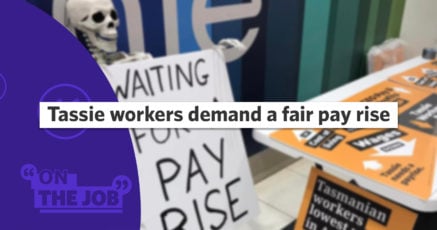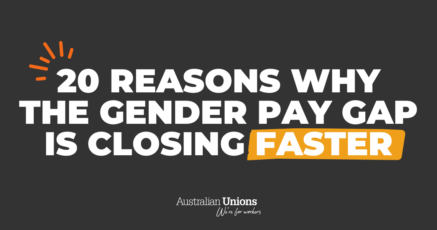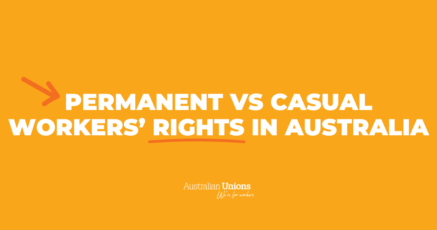Being employed at an Australian university has become a poverty trap for thousands of workers across the country, and those workers have had enough.
As the tertiary sector reels from the impact of Scott Morrison’s vaccination fiasco which has seen the flow of fee-paying overseas students evaporate, its workforce has been pushed to breaking point and is fighting back.
A meeting last week of approximately 450 members of the Sydney branch of the National Tertiary Education Union (NTEU) voted to endorse a new log of claims ahead of the latest round of Enterprise Bargaining Agreement (EBA) negotiations with almost unanimous support.
Damien Cahill, Division Secretary of the NTEU in New South Wales, told “On the Job” that the union’s focus heading into the negotiation will be confronting the sectors addiction to the casualisation of its workforce.
“The key issue for us at the moment is tackling the problem of insecure work within higher education. We need to wind that back. We need job security for all staff because last year during the pandemic showed that even ongoing staff are at risk of losing their jobs,” Cahill said.
“We are focused on paid sick leave for casual workers, ongoing rights to work from home for general and professional staff, and proper regulations to protect against overwork, which has just become rife in the industry, particularly in the last 12 to 18 months.”
Cahill outlined that the higher education sector around the country is now built on the foundations of a workforce that is seen as little more than a cost centre – disposable and replaceable.
Where working as an educator at an Australian university was once a job with entitlements and certainty, staff now find themselves on piece rates in a cycle of unsustainable seasonal work.
“About 70 per cent of all University workers are in insecure employment – either casual or fixed term.

“Wage theft is a huge problem. There’s a lot of underpayments of casual staff who are required to do far more hours than they are paid for. This could be in preparation work, marking or student consultation, all the things that are essential for academic work and that students and their parents would expect to be happening, but for which many staff go uncompensated for,” said Cahill.
The retreat from fully funding tertiary education by successive governments of all political persuasions over the last three decades has been the catalyst for the erosion of working conditions on Australian campuses, according to the NTEU.
The arrival of the COVID-19 pandemic and its devastating impact on international enrolment numbers has fully exposed the sectors’ chronic over-reliance on a casualised workforce, according to Damien Cahill.
“Universities have basically been told by the Government, if you want to make up the shortfall that you need to meet your costs, you need to go to the private market,” explained Cahill.
“And the way they’ve done that, which has been completely deregulated, is to go to the international student market.
“So, there’s been a massive increase in international student fees. Universities have known that they’ve been relying on this private source of income.
“The way they’ve hedged against that is to create a massive insecurely employed workforce, and we saw the devastating consequences of that last year when there was a downturn in that international student’s market, which the union always predicted would happen in some form.
“When that happens, the first people to lose their jobs of course were the casual workers because their work can be discontinued at a moment’s notice.”
One aspect of the tertiary sector’s pernicious employment model is the seasonal work cycle. For thousands of staff who are at the moment between semesters across Australian campuses, they are currently out of work.
“At many universities, there’s a big break in teaching over the summer period [and mid-year], where casual staff have to turn to other sources of income, or rely on their savings, or go to unemployment assistance, or try and scrape by with other jobs in other industries.
“It’s not uncommon for casual workers to be working across two or three campuses at a time or over the course of the year, just to get by.
“And while the casual workers themselves do an excellent job, and they’re often highly qualified, and their teaching is of excellent quality, it ultimately flows into poor outcomes for students.
“The casual staff don’t get paid to do a lot of things that they should be paid for. So, they don’t get paid often to do the kind of screen consultation or answering emails that would be expected.
“They essentially get paid piece rates for marking, so it might be 1000 words every six or 10 minutes. They just don’t have time to do the kinds of comments and feedback that students would expect,” Cahill said.
University staff are committed to meeting their obligation to, and the expectations of, their students but they’ve had enough of propping up the sectors failing financial model according to Damien Cahill.
“University workers believe in the social mission of universities. They want to be there, they believe that they’re playing the public role and it’s an important one and that’s why they’ll work the extra hour… but it’s just not a sustainable model.
“If we want a proper education system, it has to be funded properly.”








SHARE:
Casualisation of Australian universities must end